NVIDIA’s GeForce GTX Titan Review, Part 2: Titan's Performance Unveiled
by Ryan Smith & Rahul Garg on February 21, 2013 9:00 AM ESTCrysis: Warhead
Up next is our legacy title for 2013, Crysis: Warhead. The stand-alone expansion to 2007’s Crysis, at over 4 years old Crysis: Warhead can still beat most systems down. Crysis was intended to be future-looking as far as performance and visual quality goes, and it has clearly achieved that. We’ve only finally reached the point where single-GPU cards have come out that can hit 60fps at 1920 with 4xAA.
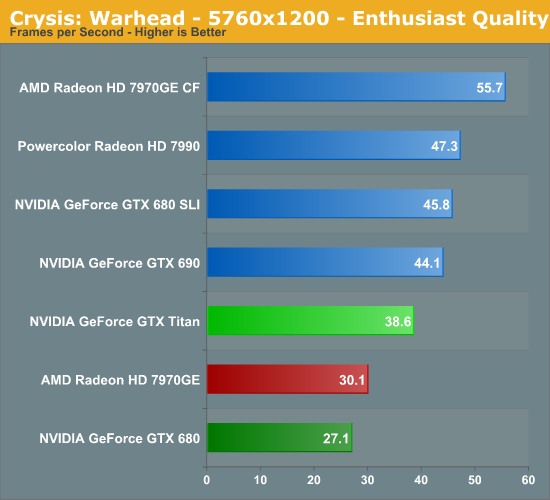
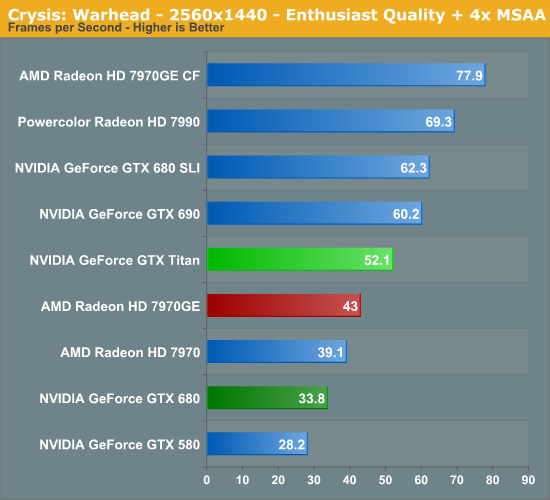
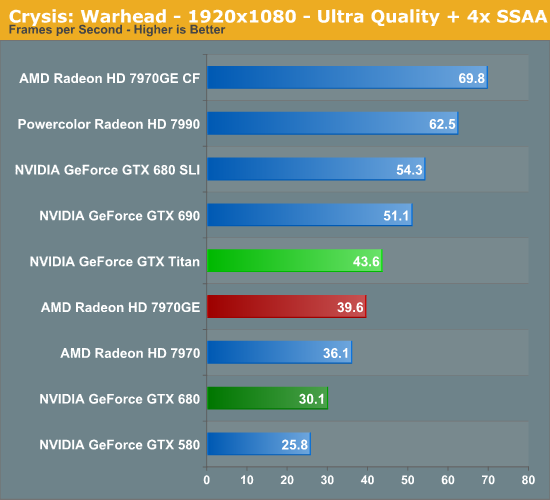
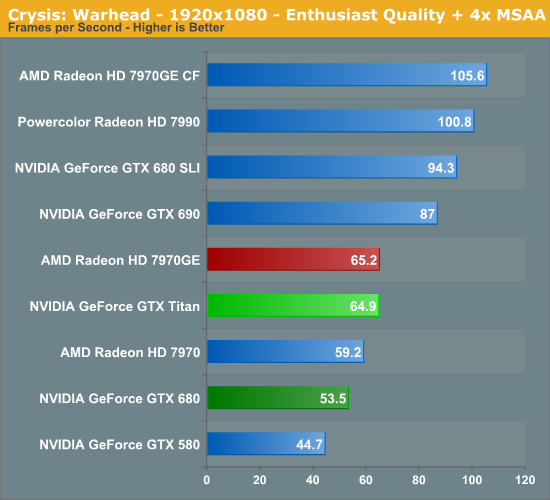
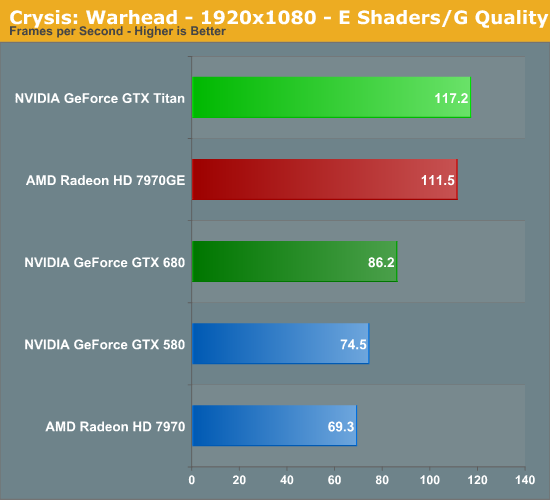
At 2560 we still have a bit of a distance to go before any single-GPU card can crack 60fps. In lieu of that Titan is the winner as expected. Leading the GTX 680 by 54%, this is Titan’s single biggest win over its predecessor, actually exceeding the theoretical performance advantage based on the increase in functional units alone. For some reason GTX 680 never did gain much in the way of performance here versus the GTX 580, and while it’s hard to argue that Titan has reversed that, it has at least corrected some of the problem in order to push more than 50% out.
In the meantime, with GTX 680’s languid performance, this has been a game the latest Radeon cards have regularly cleared. For whatever reason they’re a good match for Crysis, meaning even with all its brawn, Titan can only clear the 7970GE by 21%.
On the other hand, our multi-GPU cards are a mixed bag. Once more Titan loses to both, but the GTX 690 only leads by 15% thanks to GK104’s aforementioned weak Crysis performance. Meanwhile the 7990 takes a larger lead at 33%.
I’d also note that we’ve thrown in a “bonus round” here just to see when Crysis will be playable at 1080p with its highest settings and with 4x SSAA for that picture-perfect experience. As it stands AMD multi-GPU cards can already cross 60fps, but for everything else we’re probably a generation off yet before Crysis is completely and utterly conquered.
Moving on, we once again have minimum framerates for Crysis.
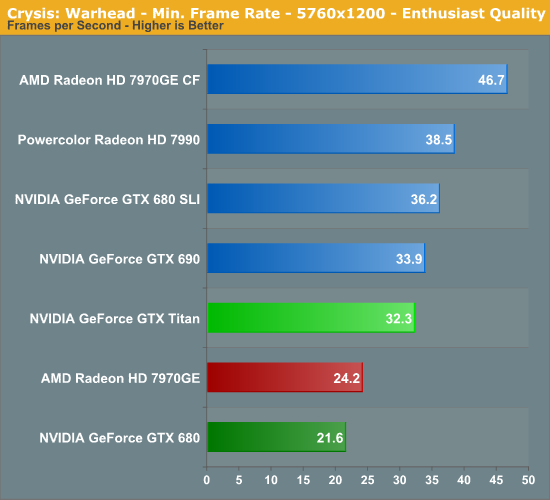
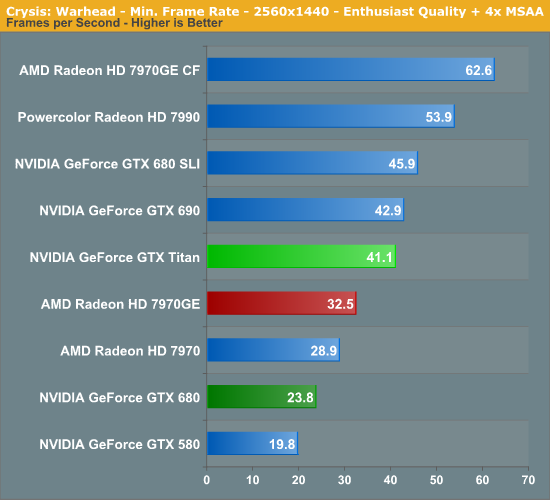
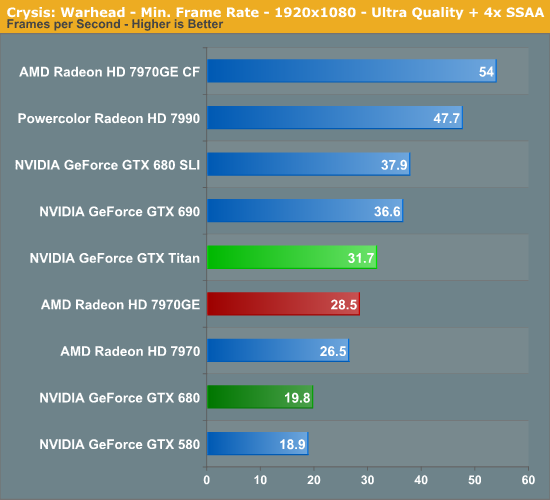
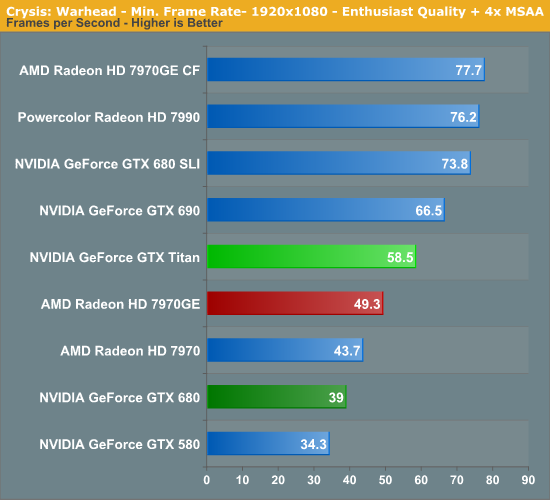
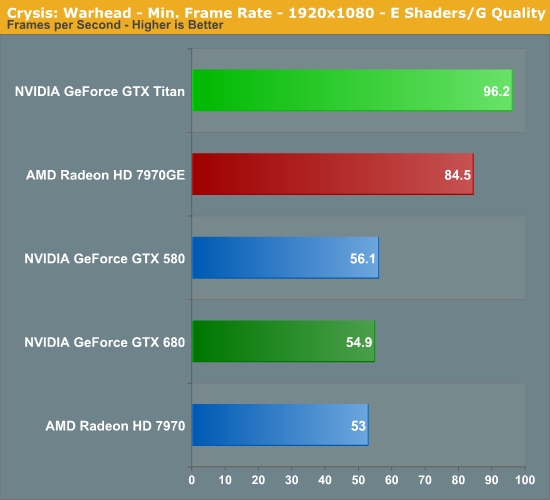
When it comes to Titan, the relative improvement in minimum framerates over GTX 680 is nothing short of obscene. Whatever it was that was holding back GTX 680 is clearly having a hard time slowing down Titan, leading to Titan offering 71% better minimum framerates. There’s clearly much more going on here than just an increase in function units.
Meanwhile, though Titan’s gains here over the 7970GE aren’t quite as high as they were with the GTX 680, the lead over the 7970GE still grows a bit to 26%. As for our mutli-GPU cards, this appears to be a case where SLI is struggling; the GTX 690 is barely faster than Titan here. Though at 31% faster than Titan, the 7990 doesn’t seem to be faltering much.










337 Comments
View All Comments
ponderous - Thursday, February 21, 2013 - link
Cannot give kudos to what is a well performing card when it is so grosslyout of order in price for the performance. $1000 card for 35% more performance
than the $450 GTX680. A $1000 card that is 20% slower than the $1000 GTX690.
And a $1000 card that is 30% slower than a $900 GTX680SLI solution.
Meet the 'Titan'(aka over-priced GTX680).
Well here we have it, the 'real' GTX680 with a special name and a 'special'
price. Nvidia just trolled us with this card. It was not enough for them to
sell a mid-ranged card for $500 as the 'GTX680', now we have 'Titan' for twice
the price and an unremarkable performance level from the obvious genuine successor
to GF110(GTX580).
At this irrational price, this 'Titanic' amusement park ride is not one worth
standing in line to buy a ticket for, before it inevitably sinks,
along with its price.
wreckeysroll - Thursday, February 21, 2013 - link
now there is some good fps numbers for titan. we expected to see such. shocked to see it with the same performance as 7970ghz in that test although!much too much retail msrp for the card. unclear what nvidia was thinking. msrp is sitting far too high for this unfortunately
quantumsills - Thursday, February 21, 2013 - link
Wow....Some respectable performance turn-out here. The compute functionality is formidable, albeit the value of such is questionable in what is a consumer gaming card.
A g-note though ? Really nvidia ? At what degree of inebriation was the conclusion drawn that this justifies a thousand dollar price tag ?
Signed
Flabbergasted.
RussianSensation - Thursday, February 21, 2013 - link
Compute functionality is nothing special. Still can't bitcoin mine well, sucks at OpenCL (http://www.computerbase.de/artikel/grafikkarten/20... and if you need double precision, well a $500 Asus Matrix Platinum @ 1300mhz gives you 1.33 Tflops. You really need to know specific apps you are going to run on this like Adobe CS6 or very specific CUDA compute programs to make it worthwhile as a non-gaming card.JarredWalton - Thursday, February 21, 2013 - link
Really? People are going to trot out Bitcoin still? I realize AMD does well there, but if you're serious about BTC you'd be looking at FPGAs or trying your luck at getting one of the ASICs. I hear those are supposed to be shipping in quantity some time soon, at which point I suspect prices of BTC will plummet as the early ASIC owners cash out to pay for more hardware.RussianSensation - Thursday, February 28, 2013 - link
It's not about bitcoin mining alone. What specific compute programs outside of scientific research does the Titan excel at? It fails at OpenCL, what about ray-tracing in Luxmark? Let's compare its performance in many double precision distributed computing projects (MilkyWay@Home, CollatzConjecture), run it through DirectCompute benches, etc.http://www.computerbase.de/artikel/grafikkarten/20...
So far in this review covers the Titan's performance from specific scientific work done by universities. But those types of researchers get grants to buy full-fledged Tesla cards. The compute analysis in the review is too brief to conclude that it's the best compute card. Even the Elcomsoft password hashing - well AMD cards perform faster there too but they weren't tested. My point is it's not true to say this card is unmatched in compute. It's only true in specific apps. Also, leaving full double precision compute doesn't justify its price tag either since AMD cards have had non-gimped DP for 5+ years now.
maxcellerate - Thursday, March 28, 2013 - link
I tend to argee with RussianSensation, though the fact is that the first batch of Titans has sold out. But to who? There will be the odd mad gamer who must have the latest most expensive card in their rig, regardless. But I suspect the majority of sales have gone to CG renderers where CUDA still rules and $1000 for this card is a bargain compared to what they would have paid for it as a Quadra. Once sales to that market have dried up, the price will drop.Then I can have one;)
ponderous - Thursday, February 21, 2013 - link
True. Very disappointing card. Not enough performance for the exorbitant cost.Nvidia made a fumble here on the cost. Will be interesting to watch in the coming months where the sure to come price drops wind up placing the actual value of this card at.
CeriseCogburn - Saturday, February 23, 2013 - link
LOL - now compute doesn't matter - thank you RS for the 180 degree flip flop, right on schedule...RussianSensation - Thursday, February 28, 2013 - link
I never said compute doesn't matter. I said the Titan's "out of this world compute performance" needs to be better substantiated. Compute covers a lot of apps, bitcoin, openCL, distributed computing projects. None of these are mentioned.